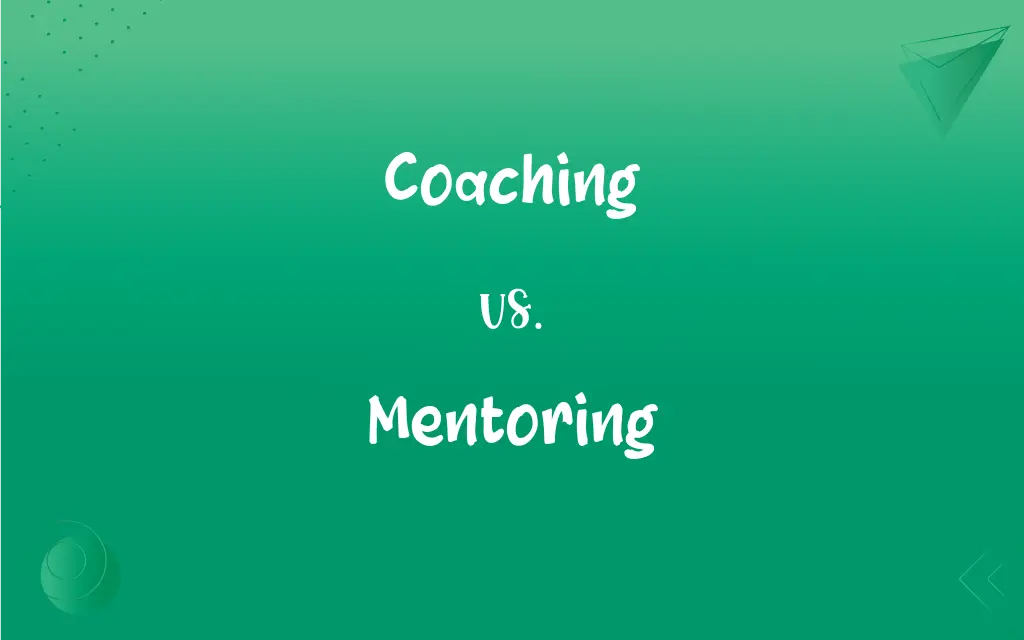Coaching vs. Mentoring: What's the Difference?
Edited by Aimie Carlson || By Harlon Moss || Updated on October 25, 2023
Coaching is a structured process focusing on specific tasks or skills, while mentoring is a relationship-based guidance for personal and professional growth.

Key Differences
Coaching and mentoring are both essential tools in personal and professional development, but they differ in their approach and goals. Coaching is generally more structured, with set objectives and timelines. It typically targets specific skills or tasks. A coach might be hired, for instance, to help an executive improve public speaking skills or to aid an athlete in refining a particular technique.
On the other hand, mentoring is a more holistic approach, often long-term and relationship-based. It's not strictly about improving a specific skill but about overall growth and development. Mentoring involves sharing of wisdom and providing guidance based on the mentor's experience. A mentor might assist a younger professional in navigating the challenges of a career or offer insights about balancing work and personal life.
One can think of coaching as task-oriented and short-term, while mentoring is relationship-oriented and long-term. For example, a sales representative might seek coaching to hit a certain sales target, receiving strategies and tools to achieve that specific goal. In contrast, the same representative might seek mentoring to understand the broader industry, its challenges, and opportunities, benefiting from the mentor's accumulated knowledge and experience.
Another significant difference is the way feedback is provided. In coaching, feedback is often direct, specific, and tied to a particular task or objective. In mentoring, feedback might be more general, encompassing a wider range of topics and often delivered in a storytelling or shared experience format, emphasizing wisdom and perspective.
Comparison Chart
Focus
Task or skill-specific
Personal and professional growth
ADVERTISEMENT
Duration
Typically short-term
Typically long-term
Relationship
More formal and structured
More informal and based on mutual trust
Feedback Style
Direct and specific
Broader, shared experiences
Primary Objective
Achieve specific goals or enhance particular skills
Provide guidance and share wisdom based on mentor's experiences
Coaching and Mentoring Definitions
Coaching
A methodical approach to improve specific skills or attain particular objectives.
The company hired a coach to improve team collaboration.
ADVERTISEMENT
Mentoring
A partnership built on trust, aimed at overall growth.
The mentoring relationship between the CEO and the young manager was evident in their mutual respect.
Coaching
Providing direct feedback and strategies to achieve desired results.
Through coaching, he learned techniques to manage his time effectively.
Mentoring
Offering guidance based on personal experience and wisdom.
His mentoring helped her navigate the complexities of the corporate world.
Coaching
Short-term, goal-oriented training.
Her coaching sessions helped her refine her presentation skills.
Mentoring
Helping mentees see perspectives based on the mentor's experiences.
His mentoring was invaluable, filled with industry insights and advice.
Coaching
Task-focused and structured guidance.
The coaching program provided tools to boost sales performance.
Mentoring
A long-term relationship for holistic development.
Under his mentoring, she grew both personally and professionally.
Coaching
Enhancing performance by identifying and rectifying weaknesses.
After coaching, the team significantly improved its project execution.
Mentoring
Sharing insights, providing support, and fostering growth.
Her mentoring sessions always included stories from her own career.
Coaching
A bus, especially one designed for long-distance passenger service.
Mentoring
A wise and trusted counselor or teacher.
FAQs
Is coaching more formal than mentoring?
Typically, yes. Coaching is often more structured and task-oriented.
Are mentors always older or more experienced?
Not necessarily, but mentors typically have experience or wisdom in the relevant area.
Can a mentor also be a coach?
Yes, a mentor can provide coaching on specific tasks or skills when necessary.
Which is typically longer-term: coaching or mentoring?
Mentoring is usually longer-term, focusing on holistic development.
Is coaching more about skills than personal growth?
Generally, yes. Coaching targets specific skills or tasks.
Is coaching more result-oriented?
Yes, coaching is usually goal-oriented with specific objectives in mind.
Can mentoring occur naturally?
Yes, many mentoring relationships develop organically without formal initiation.
How is coaching different from teaching?
While both are educational, coaching is more focused on specific goals or tasks, while teaching is broader.
Can coaching be long-term?
While coaching is typically short-term, it can extend longer based on goals and needs.
Can feedback in coaching be critical?
Yes, feedback in coaching is direct and aimed at improving specific skills or tasks.
Is coaching always done face-to-face?
No, coaching can be done in person, over the phone, or even online.
Is feedback in mentoring always positive?
Not always, but it's often delivered in a constructive, supportive manner.
Are mentors always assigned, or can you choose one?
Some programs assign mentors, but in many cases, individuals choose mentors based on mutual rapport.
Is the primary purpose of coaching to solve performance issues?
Not always. While it can address performance, coaching can also enhance existing skills or learn new ones.
Is mentoring always a formal arrangement?
No, mentoring can be both formal and informal, based on mutual trust.
Do mentors get paid for their guidance?
While some formal mentoring programs might compensate mentors, many mentoring relationships are voluntary.
Do mentors always work in the same industry as the mentee?
Not always, but industry-specific knowledge can be beneficial in mentoring.
Can coaching be done in groups?
Yes, there are group coaching sessions, especially in organizational settings.
Is a mentoring relationship equal?
While the mentor typically provides guidance, it's a mutual relationship with both parties benefiting.
Can a person benefit from both coaching and mentoring simultaneously?
Absolutely. Both can complement each other in personal and professional development.
About Author
Written by
Harlon MossHarlon is a seasoned quality moderator and accomplished content writer for Difference Wiki. An alumnus of the prestigious University of California, he earned his degree in Computer Science. Leveraging his academic background, Harlon brings a meticulous and informed perspective to his work, ensuring content accuracy and excellence.
Edited by
Aimie CarlsonAimie Carlson, holding a master's degree in English literature, is a fervent English language enthusiast. She lends her writing talents to Difference Wiki, a prominent website that specializes in comparisons, offering readers insightful analyses that both captivate and inform.































































